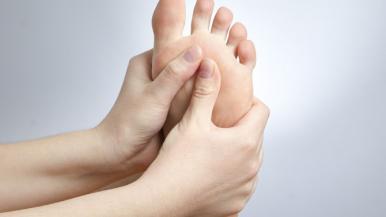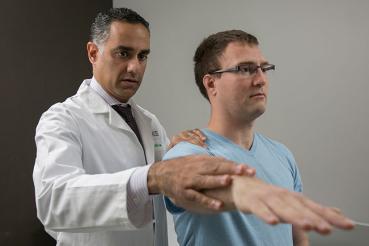You've probably heard that the eyes are the window to the soul. But has anybody ever told you that the feet are the window to the body?
A number of body-wide health issues can disguise themselves as foot problems. So we checked in with Simon Lee, MD, a foot and ankle orthopedic surgeon at Rush University Medical Center, about what your feet might be trying to tell you.
1. Ongoing pins and needles or numbness in both feet.
Might be a sign of: Neuropathy, or nerve damage, possibly caused by diabetes
"The most common reason for neuropathy in the feet is diabetes," says Lee, explaining that elevated blood sugar causes damage to nerves.
An unsteady gait that can cause a fall is one risk of neuropathy. Another is that loss of feeling might prevent you from noticing a cut or sore (see below) that can quickly turn into a dangerous infection.
Everyone's feet fall asleep now and then. But if you regularly notice tingling that lasts longer than a few minutes, see your primary care doctor.
2. A foot sore that won't heal.
Might be a sign of: Diabetes or peripheral vascular disease
In addition to causing nerve damage, high blood sugar might also damage the blood vessels that supply nerves, causing circulation problems that prevent healing.
"Something as simple as a blister on the heel, left untreated, can lead to a serious bone infection," Lee says. This could lead to hospitalization and, in extreme cases, amputation.
If you have a sore that won't heal after three to seven days even though it's not continuing to be irritated (by a poorly fitting shoe, for example), see your doctor.
3. Swollen ankles and feet.
Might be a sign of: Heart failure, kidney disease, liver disease or a blood clot
Painless swelling in the feet is basically gravity in action. If your heart, liver or kidneys aren't working properly, you'll have excess fluid in the body that leaks into your tissues and drains down into the feet.
If the swelling is painful, seek medical help immediately: It could mean that you have deep vein thrombosis, or a clot that's blocking the flow of blood. If the clot breaks free, it could travel to your lung and cause a potentially fatal pulmonary embolism.
4. A suddenly, intensely painful and swollen big toe.
Might be a sign of: Gout
Gout is an inflammation caused by a buildup of uric acid that forms crystals in the joints. It is a painful condition that can lead to kidney problems if left untreated.
Fortunately, gout is generally treatable with medications and dietary adjustments, Lee notes.
For example, your physician might advise you to avoid these foods:
- Organ meats such as liver and kidneys
- Some seafood, such as tuna, mussels, scallops, trout and sardines
- Beer and distilled liquors
When the same exact symptoms affect both feet at once, it's much more likely to be an issue related to something other than your feet.
5. Pain in the foot when walking or exercising that goes away when resting.
Might be a sign of: A stress fracture, which could in turn be a sign of osteoporosis
Stress fractures are hairline cracks in the bone most often caused by repeated stress such as running long distances.
If Lee sees a patient with a stress fracture who's not an endurance athlete, he'll likely order a bone density test (DEXA scan) and blood studies to check for calcium and vitamin D deficiencies.
6. Sore toe joints in both feet.
Might be a sign of: Rheumatoid arthritis
Foot and ankle specialists are often the first to diagnose rheumatoid arthritis. The telltale symptom: pain in both feet.
"When the same exact symptoms affect both feet at once," Lee says, "it's much more likely to be an issue related to something other than your feet."
Keep an eye on your soles ...
It's important to make sure your primary care doctor checks your feet regularly. "Anybody can get into trouble quickly if they have a foot problem," Lee explains.
That goes double if you have diabetes: The No. 1 reason diabetics are admitted to the hospital is complications with their feet.
... and be sweet to your feet
To keep your feet healthy and catch any issues early, follow these essential tips for general foot care:
- Keep your feet dry. If you think about it, your feet spend a lot of time in the dark and humidity inside your socks and shoes, You have to keep your feet dry to keep the skin healthy and prevent fungus and infection. Wear high-quality cotton socks and use foot powder daily.
- Be careful with the clippers. You wouldn't believe how many people of all ages go to see their doctor for ingrown toenails, which are very painful and can become infected. To avoid this, cut your nails straight across at the tip of the toe — not too short, and not with rounded corners.
- Invest in comfortable shoes. People often don't realize that their feet change as they age. Our feet get bigger and wider over time; our arches flatten; our toes start to curl. It's important to make sure that your shoes are the right size with enough room in the toe box. Don't ever assume that you'll be able to 'break in' uncomfortable shoes — you should be comfortable immediately upon trying them on in the store.
- Make sure your salon is sanitary. If you get pedicures, it's important to pick a salon that properly cleans and sterilizes its equipment, preferably by using hospital-grade disinfectant in its foot baths and autoclaving its tools. Poor salon sanitation can leave you with a bacterial infection, nail fungus or plantar warts.
- Check those toes. When you bathe, don't skip washing your feet — not only does it help you keep skin healthy, but it's an easy way to do a quick check for possible infections, ingrown toenails or other issues.




